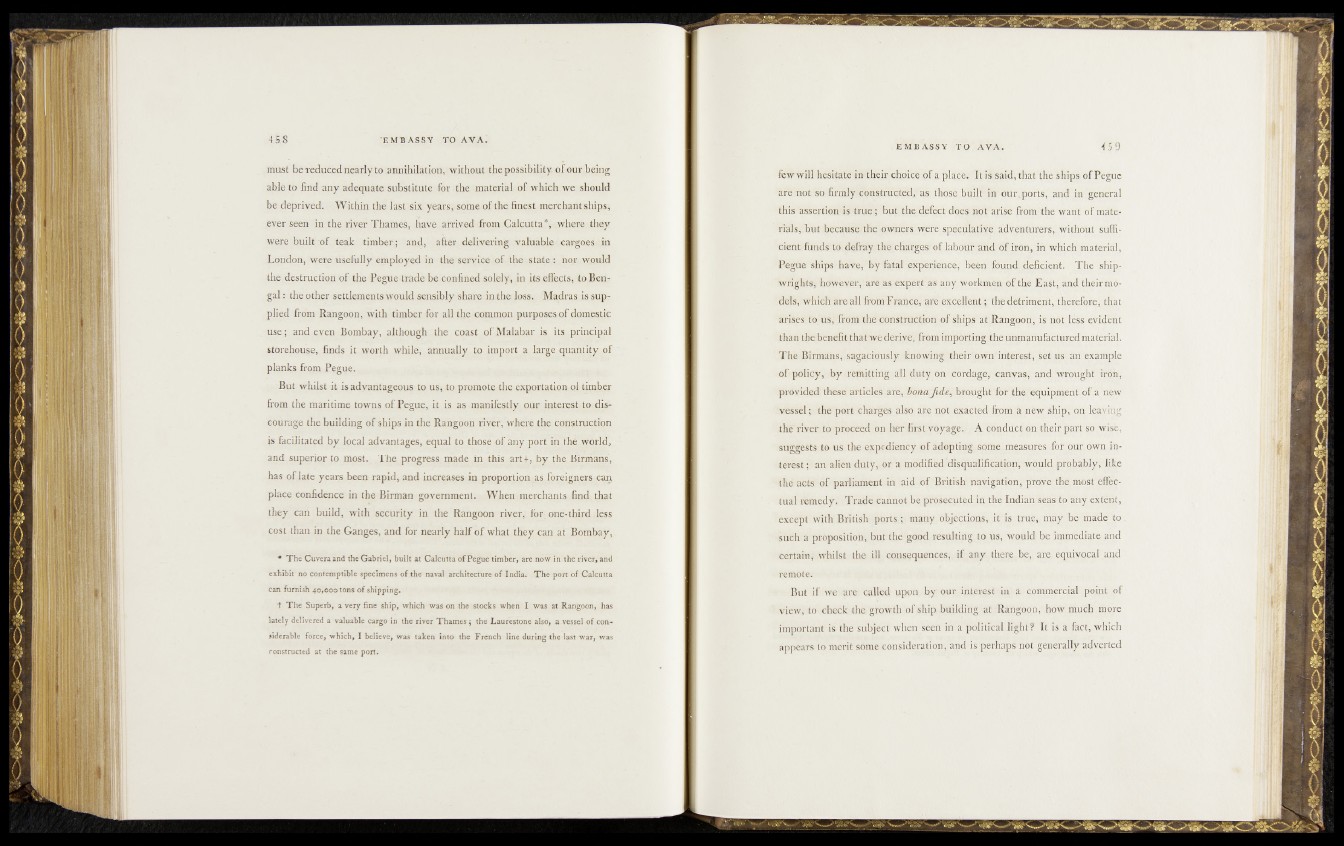
must be reduced nearlyto ;anni hil a tion, without thepossibihl^s^Wii^^Ing
,a|j*lè.to!find any adequate, substitute for-the material ofwhich.we should
be deprived. Within, the last •sisc'yearsv-.sqme of thefejest merchant ships,
ever seen in the river Thames, have arrived -from.Galcutta,*, where..they
were built red. teak timber.; and, after deliveringi.'iwalhable+'Gapgoess in
London, were usefully employed in the seryiee-s.o£' J.hei.state : nor- wpuld
the destruction of the Pegue trade be confined solely, in its effects, to Bengal
: the other settlements would sensibly share in the loss. Madras is supplied
from Rangoon, with timber for all the common, purposes of dbmfi^ip
use; and even Bombay, although the eqast, of Malabar is its principal
storehouse, finds it worth while, annually to import a. large quantity«pf
planks fr^an,Pegue. g j |
But whilst it is advantageous to us, to.promote the
from.the maritime towns o f Pegue, it is as manifestly. oUr interest to discourage
the building of ships in the Rangoon river, where tfie- construction
is facilitated by local advantages, equal to those of an-^rport in world,
and superior to most. The progress made ,m this artA. Kv. the Bjrmans,
has ofilate yeaxs been rapid, and increases in.p ro p q rtip i^ asA |m ffi^p ffi.
place confidence in the Birman government. WhenjnaerGhjnts. -{jock ifiat
they can build, with security in the Rangoon river,' for-; öfig-tfiirddéss
cost than in the Ganges, and for nearly half of what they ‘ c anïa t Bömbp.y v
* The Cuvera and the Gabriel, built at Calcutta of Pegue timber, are now in'the rivet,1 aiid
exhibit'no contemptible specimens o f the naval architecture o f India. T he port of'Calcutta
can furnish -fo.oootons o f shipping.
+ T h e Superb, a very fine ship, which was on the stocks when I was at Rangoon, has
lately delivered a valuable cargo in the river Thames ; the Laurestone also, a vessel of considerable
force, which, I believe, was taken into the French line during the last war, was
constructed at the same port.
few wilbhesrfcate jn^fch'e»qhoiCB .of that the ships of Pegue
are son etncF,' in ^speral
this'-'^ertl0l^|^^ia.e|;!'i8 ||^ ^ ^ f g c t '';d q ^ f^ql|;a^ise'd^6mithe warfj of mttte-
¥Ms;:.biitib ylppe SP W e /3, w if e ’ok sfifficieQlduhd^
t'dfdtelr-ay itl^cfiiAgcs’ ol 1 ihtifjfej^d. ©f’h;qn,.in whicB&afdrial,
Tte^ufi/’sRips h a ^ e / ^ ‘h itB ^ f& ^ tn e , foiindijddTciepit. ’.The shij»-
Iwmghtstr'hefwIVer;]are as expert a s'w tu k rfienO o fjd ie Ea.st, and theirino-
dels, whfcfrare all ‘ftomTr^cqJ;ara^jLMqA^'l'hfeMefidm'eM,,jMrfe^ffer&iat
akises'fe us, from ^h^GQnsticup^bn of sdj i p^aMkangtion, j“’ mLh-ss itid u it
.than the benefit ihafwe der,iye, from ip*p|fe!ngdW^|pi®ufdctured%natgi^I.
The Bij^iansgsagatiCiusiy kpowipg^ fhert%5^n!ip^efest, set ds'1, an epatmfLe
-oftpofisy,. b,y ■ refidtting^fi^ljfil^ont«pbrda.ge,- caqvas^dfil nfftiiligljt jrfin,.
.provided these BtiMdk-are, bona Jid <■ ,}Hfroug1Jttfor'ilie equipment ofiBbiuw
vessel; the- port charges also are noti&afedtfrpm.'S.*'nfew ship'. pn ie.n Fng
the’ ri'vefrid-,proceed onfrefifirat^Yoy^ge.;jV'A'jbnducfyonthpit pint so wfstv
'suggests to us the expediency o f a ^ ^ ti^s.q^afi^p® asui^^&^ta|1.'own interest
; an alien duty,Bp a modified dls^alificatlofr'two.uld pt'obabfcddce
•.iiKd'aCts■ of parliament in 'aid of Biitfshl navigation! prdve the m o s |||||||-
tual rfemedy. Trade cannot beprbseeuted^ii the Indian'sfeas to a'ny extent,
except with British, ports m ^y ifb fi^Q t^ ^ ^ it^ i^ e fe l, may’nb‘ei)il;®^i|»
•such a proposition, but the gopd, resultipgjtpjus, wojild>,|(bSmmediate..and
certain ^whilst the ill, Gpn^quences;(ffi(a ^ ^ h eE § ib ^ a re t equiyopal dad
remote.
i-s-Sut if we are' called uponyfiy our.'ipkerqsfc in a ' commercial poipt.of
view, to check the growth of’sfiip. buildirig 'at -Rangoon, how much .more
important is the subject when sden ih’ a ‘p6Hticar;li|hf? It is a'fact,-Which
appears to met it some consideration, and is perhaps’not generally adverted